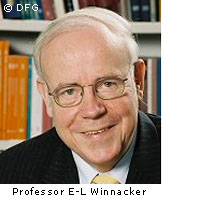ERC to become 'the voice of scientists', says Secretary General Winnacker
One of the most important new elements of the Seventh Framework Programme is the establishment of the first pan-European funding agency for frontier research, the European Research Council (ERC). In an interview with CORDIS News, the ERC's first Secretary General, Professor Ernst-Ludwig Winnacker, talked about his hopes for the ERC and the importance of helping young researchers advance in their careers. Having spent the last nine years as President of the German Research Foundation (DFG), Professor Winnacker knows a thing or two about running a large research funding agency. On a day-to-day basis he sees his new role as representing the voice of the scientific community, and of the Scientific Council which represents that community, in Brussels. 'We will try to devise funding schemes which are user friendly for the scientific community and which respect autonomy as well as scientific excellence, the basic aspects under which this Council was founded,' he explains. According to Professor Winnacker, the biggest challenges of the job will be to safeguard the autonomy of the ERC and ensure it develops its own distinct identity as a body with which the scientific community can identify. 'We have to be visible as the European Research Council and not as a Directorate General or something,' he says. 'In this endeavour we are accountable to the scientific community of Europe.' One of his first tasks in the post will be to set up the Starting Grant, which the ERC will give to young researchers wishing to establish their first research team. Professor Winnacker has considerable experience of running schemes for young scientists; the Emmy Noether Programme for young researchers was a highlight of Professor Winnacker's presidency of the DFG, and was instrumental in launching the EURYI (European Young Investigator) awards of EuroHORCS, the organisation bringing together heads of European research councils. 'I think one of our weaknesses here in Europe is the early independence of young scientists,' he comments. 'My feeling is that the strength of a scientific system is strongly related to how it deals with graduate students, post docs and with career perspectives of scientists. We must develop careers which are attractive.' He firmly believes that the best people need to become independent early. 'Otherwise the system will not work, they will feel themselves in chains and they will not be able to freely execute what they think,' he says. 'If you have your own position and money for your little research group [...] then you can come to any faculty and say 'here I am',' he explains. Those which do not welcome you, you don't go to, he says simply. Apparently the DFG's Emmy Noether grantees have a website where they keep a 'blacklist' of faculties and institutions which are less than welcoming to young, independent researchers. 'There are always faculties who don't want people who have independence,' says Professor Winnacker. 'But good faculties love independent people, and young independent minds.' Warming to his theme, he underlines the importance of treating young researchers well. 'You have to give them the best graduate students, you have to properly mentor them so that they can advance in their career,' he says emphatically. 'What I mean is that they are scientifically independent but do not yet have a secure career development path. Thus, you have to help them, you have to create conditions so that they can find a more permanent job after five or six years. 'Young scientists are the biggest treasure we have,' he adds. 'This is why I was very happy that the [Scientific] Council decided to start the starting grant.' On the subject of how the ERC will complement the work of the national research councils, Professor Winnacker is optimistic. 'The ERC budget on average is one billion a year, and it has to compete with the national councils' budget which adds up to 20 billion. So in order to make an impact the ERC has to be really good, it has to design instruments which create added value and one of them is the young investigator's grant,' he comments. Professor Winnacker will hold the post of Secretary General for two and a half years before handing over to the Spanish economist Andreu Mas-Colell in July 2009. The two men have already met and Winnacker is planning to invite Mas-Colell to Brussels next spring once he has settled in himself. He will then keep him in touch with what is going on so that the hand over will be as smooth as possible. As for the future, Professor Winnacker is hopeful that the ERC will be able to attract increased funding beyond the end of FP7. 'If we are a success story, everybody will be happy to give us more. If not, if people think it was too early, this will not happen,' he says. 'So we are bound to success, we are forced to succeed, and we will.'



